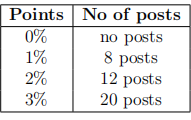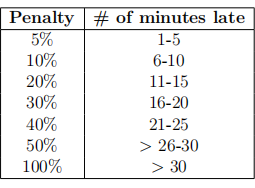关键词 > STA457H1/STA2202H
STA457H1/STA2202H F-LEC5101 Time Series Analysis
发布时间:2021-09-13
Hello, dear friend, you can consult us at any time if you have any questions, add WeChat: daixieit
Faculty of Arts and Science Course Syllabus
Department of Statistical Sciences
Time Series Analysis
STA457H1/STA2202H F-LEC5101
Fall 2021
1 Course Content
This course will be offered entirely online, with a combination of synchronous lectures and asynchronous video lectures. The majority of the course content will be uploaded to Quercus as pre-recorded videos to be watched prior to the synchronous meetings. Further, any important announcements will also be posted in Quercus. Please make sure to check it regularly so you don’t miss anything.
● https://q.utoronto.ca/courses/204859
● The synchronous classes will occur through Zoom and will focus on additional materials, worked examples and demonstration of concepts using the R statistical software.
● This is a fully online course. Live class sessions, tests, and quizzes will be held via Quercus. Students are responsible for ensuring that they have reliable internet.
Course materials provided on Quercus are for the use of students currently enrolled in this course only. Sharing (e.g., posting, providing, selling) course materials with anyone outside of the course is considered unauthorized use.
Lectures:
● We will use a mix of synchronous learning and asynchronous learning.
● Lecture slides, along with asynchronous video lectures, will be uploaded weekly.
● We will use the scheduled lecture times for problem-solving and live question-answer(QA) sessions followed by a 30-45 minutes quiz.
● Tutorials are held on Tuesday 8-9 PM EST. Each week during the tutorial, you will be given an R-related problem to work on with the help of the TA or apply the concepts learned in the lectures. Make sure to follow any instructions that your instructor has written and leave enough extra time before the due date to submit your work successfully.
2 Course Description
An overview of methods and problems in the analysis of time series data. Topics include: de-scriptive methods; filtering and smoothing time series; theory of stationary processes; identifica-tion and estimation of time series models; forecasting; seasonal adjustment; spectral estimation; bivariate time series models.
Course Prerequisites
See Academic Calendar to learn more about course prerequisites.
Course Objectives/Learning Outcomes
By the end of this course, all students should have a solid understanding of methods and problems in analyzing time series data with a primary application in Economics, Business, Finance, Physical and Environmental Sciences. The course will cover theoretical and practical aspects of time series analysis, making extensive use of the R statistical software.
● Understand and reason with the basic time series concepts
● Interpret and compare different time series models
● Identify and model different types of time series data
● Perform time series modelling/forecasting and present the results
● Use R to construct time series models and conduct analysis
3 Course Materials
Textbook:
Time Series Analysis and Its Applications
With R Examples, 4th Edition
by Robert H. Shumway & David S. Stoffer.
ISBN 978-3-319-52451-1
ISBN 978-3-319-52452-8 (eBook)
Statistical Software:
We will be using RStudio for performing statistical analyses. R is a free software that can either be downloaded onto your personal computer or used in the cloud. If you choose to work with R on your personal computer, then installation will be a two step process:
● The base R framework is available for download at http://cran.r-project.org for Windows, Mac and Linux operating systems.
● Next, RStudio is a good integrated development environment to R (makes it simpler to work in R) and can also be downloaded for free at https://www.rstudio.com/products/rstudio/download.
For each tutorial, it would be required that you submit a reproducible RMarkdown file with your codes and a knitted RMarkdown document as your data analysis report. To learn more about RMarkdown, refer to https://rmarkdown.rstudio.com/index.html.
4 Course Assessment

Students must complete the final project, at least one test, six (6) tutorials and six (6) quizzes in order to pass this course.
Participation Marks:
We will have two participation components: the Piazza and in-class participation polls. All students must participate in the Piazza for class discussion worth 3% of the final grade. And also participates in the in-class polls, then you will receive an additional 2% in participation marks, worth a total of 5% participation in your final grade.
● Piazza for class discussion: In each class discussion, you are expected to post a ques-tion from the associated lesson or reply to questions/responses of one of your classmates. In general, marks will only be awarded for posts on course content. Your final participa-tion mark will be calculated as follows:

● In-class participation: Poll questions will be posed using the Poll Everywhere software. See Quercus for instructions on how to join. You will receive participation credit for each question answered (correctness does not matter). If you answer > 60% of all questions, you will receive the full 2% for the in-class participation. Otherwise, you’ll receive 1% for answering 30-60% of polls, and 0% for answering <0-30% of polls.
Weekly Quizzes:
There will be 8 “weekly” quizzes throughout the term, which will occur each Tuesday in the last 30-45 minutes of the synchronous lecture time (except for the first two weeks and weeks with a term test) in Quercus.
We will take the best seven quiz marks and drop the worst quiz in the calculation of your overall quiz mark. We will not be making any accommodations for missed quizzes, and these will receive a mark of 0, but we will drop one quiz as part of the worst quiz marks. Therefore, you may miss one quiz without penalty. There are no make-up quizzes, so they will be given zero beyond the one that will be dropped.
Weekly Tutorials:
There will be 10 Tutorials that will be occurring each Tuesday from 8-9 pm EST. We will take the best 8 tutorial marks and drop the worst two tutorials to calculate your overall tutorial mark. Because only the best 8 tutorial marks will be counted, we will not be making any accommodations for the missed tutorial. These will receive a mark of 0, but we will drop two tutorials as part of the worst tutorial marks. Therefore, you may miss two tutorials without penalty. Late tutorial assignments will be accepted but subject to a 20% penalty per day late. Late submissions will not be allowed beyond 48 hours of the due date.
Tutorial assignments and quizzes can be found under Quercus Assignments in the naviga-tion bar or through the link provided in that weekly module and will only be available during the designated time. Tutorial assignments and quizzes must be done individually.
Term Tests:
Term Tests: There will be 2 term tests during the term, up to 90 minutes long each, worth a total of 30% (i.e. 15% each). These will be online and available through Quercus. The dates of the 2 term tests are:
● Test 1: Oct. 19th at 6-7.30pm EST
● Test 2: Nov. 23rd at 6-7.30pm EST
Final Project:
The project will involve analyzing time-series data and writing a brief report. First, you will need to choose a suitable time series. You can select a data set either from the “astsa” library that we used for this course https://cran.r-project.org/web/packages/astsa/astsa.pdf or any other resources. Choose a time series that
● interests you,
● is not too small it should have more than 100 observations,
● can easily be made approximately stationary
● is a different time series chosen from the lecture notes, quizzes, and assignments.
5 Course Policies
1. This term we will be using Piazza for class discussion. The system is highly catered to getting you help fast and efficiently from classmates, the TA, and myself. Rather than emailing questions to the teaching staff, I encourage you to post your questions on Piazza. All questions about course material should be posted here or asked during Instructor/TA office hours. The instructor and TAs will monitor the board and will help answer ques-tions, but students are encouraged to answer posts and help their fellow classmates. If you have any problems or feedback for the developers, email [email protected]. Find our class signup link at: https://piazza.com/utoronto.ca/fall2021/sta457h1flec5101.
2. Instructor and TAs will hold office hours through Zoom. The office hour schedule and Zoom link will be posted on Quercus. It is recommended that you visit during office hours whenever you have a question about the material. It is more important than ever in an online class to have material clarified as quickly as possible. Please post your questions at least three hours before the due date. Don’t wait until the last minute to ask your questions!
3. E-mail is appropriate for emergencies or private matters. Use your *utoronto.ca account. You will not get a response if you email from other email addresses. Write a proper email, including the course number STA457H1/STA2202HS L5101 in the subject line. The email should contain the addressee, your official name and UTORid for identification purposes. Please do not Email your instructor asking questions like “how to do problem 2 in tutorial assignment 1?”, “when is Test 1?”, “how to submit the quiz?”. E-mails with questions like these will be ignored and should be posted on the Quercus discussion board. Otherwise, students should expect a reply within two business days.
4. You must not copy mathematical derivations, computer output and input, or written descriptions from anyone or anywhere else, without reporting the source within your work. This includes copying from solutions provided to previous semesters of this course. Please read the UofT Policy on Cheating and Plagiarism, and don’t plagiarize. If I confirmed any accused of cheating, the students involved would receive a 0% mark.
5. You should join the Zoom meeting to write your quizzes and tests for this course at the scheduled class time. You must have a working webcam. The Zoom link will be available under weekly Quercus modules.
6. Please be cautious if you are trying to upload your answers for your quiz/test at the last minute, you might miss the deadline. There will be a penalty for those who submit up to 30 minutes late and quiz/test submitted more than 30 minutes late will not be accepted.

7. This course follows the University of Toronto’s Policies on missed assessments and requires students to complete the Absence Declaration on ACORN if an assessment is missed due to illness. In addition to completing this absence declaration form, you must report your absence to the instructor by email within 48 hours of the assessment due date to request accommodation. Emails after this deadline will not be accepted. Other reasons for missing an assessment will require prior approval by your instructor. If approval is not granted in advance for non-medical reasons then 0% will be recorded for the missed tutorial/quiz/test. Note: If you submit an assessment, it will be assumed that you deemed yourself fit enough to do so and your grade will stand as calculated. No accommodation will be made based on reports of medical, physical, or emotional distress after the fact.
8. Any requests to have marked assignment/quiz/test re-evaluated must be made in writing by email to [email protected] within 48 hours after the grades are released. The request must contain a justification for consideration. Be sure to include your official name and student number for identification purposes. The teaching team should process regrading requests within two weeks of the requested date. Please note that the teaching team reserves the right to review a part of the whole of your assignment. Hence, your marks may go down, up or remain the same.

